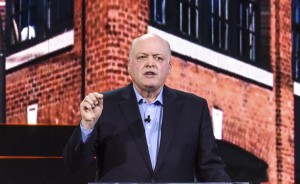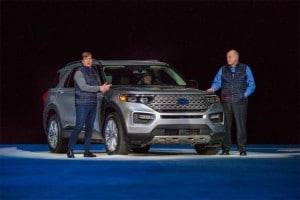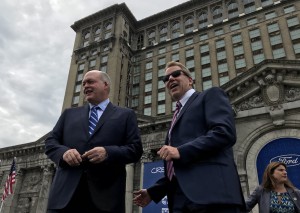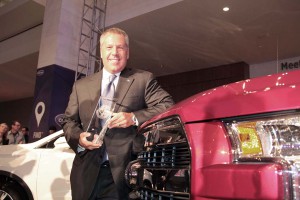
Jim Hackett, chief executive officer, Ford Motor Co., said he will work closely with new COO Jim Farley to turn the automaker around.
Days after revealing a $1.7 billion fourth-quarter loss, Ford Motor Co. announced a major management shake-up designed to not only get its traditional business back on track but also to push forward with its transformation into the “mobility services” company CEO Jim Hackett has envisioned.
The shake-up sidelines Joe Hinrichs, a 19-year Ford veteran, who retires after most recently serving as president of automotive operations. Jim Farley, currently the president of new business operations, becomes chief operating officer. In that role he will closely work with Hackett on Ford’s push to develop electrified and autonomous vehicles and associated services.
“We’ve been working very hard to improve the fitness of the business,” Hackett, a former CEO of Steelcase, told reporters during a Friday morning conference call.
(Ford names Farley COO; President, Automotive Hinrichs retires.)
The announcement came just days after Ford reported a deeper-than-expected deficit for the fourth quarter of 2019, the automaker barely turning a profit for the full year. Despite the timing, IHS Analyst Stephanie Brinley said she did not believe the executive realignment was directly triggered by the earnings shortfall, but was something “in the works” for quite some time.

Hackett, right, said Farley, left, is the the right person to take on the new role of chief operating officer.
Hinrichs had actually been working to streamline Ford’s bloated bureaucracy since being named president of automotive operations several years ago. He previously told TheDetroitBureau.com that he expected it would impact all levels of the company, up to senior management.
That said, there had been speculation in recent months that his job was in jeopardy, particularly as a result of last year’s flawed launch of the new Explorer SUV, one of Ford’s most critical products. That was a major factor behind the company’s weak earnings, along with sales-related losses in China, the world’s largest automotive market.
During the conference call with reporters, Hackett tried to avoid finger-pointing, repeatedly praising Hinrichs and not only spreading blame for Ford’s current problems but also taking on some of it himself.
Indeed, with Ford stock now near a 52-week low, there have been questions raised about CEO Hackett’s own tenure. Anticipating a likely question about his job during the conversation with reporters, the executive said, “I plan to stay.”
That suggests Hackett still retains the support of the Ford board of directors – on which he also serves – as well as Bill Ford Jr., the great-grandson of company founder Henry Ford and the automaker’s chairman. Both men are aligned on the need to transform the company into a “mobility services” enterprise focusing on electrified and autonomous vehicles, as well as ride-sharing and related services – “smart vehicles for a smart world,” Hackett said Friday.

CEO Hackett, left, and Chairman Bill Ford are assumed to still be on the same page about the reversal of the automaker’s fortunes.
(Disastrous fourth quarter hurts Ford’s full-year earnings.)
And that, Hackett made clear, is why Jim Farley becomes his top lieutenant. “Jim Farley is the right person to take on this important new role,” the CEO said, adding that they “will work tightly” together to bring Hackett’s vision to fruition.
“It’s going to be important that those two leaders are in sync,” said analyst Brinley. “If they are, they will be stronger.”
Ford is by no means the only automaker struggling to cope with an era of massive change. Mary Barra, the CEO of rival General Motors, has frequently said, “The auto industry will undergo more change over the next five years than it has over the last 50.”
There remains plenty of skepticism about how traditional automakers, like GM and Ford, will handle the transformation, something underscored this week by the slide of their stock, even as upstart challenger Tesla shares surged to new record highs.
Ford is in the middle of an $11 billion investment program bringing at least 11 electrified vehicles to market. That includes its first long-range, all-electric model, the Mustang Mach-E coming to showrooms later this year. It is spending billions more on autonomous vehicle development.
But Hackett made clear it must also feed and nourish its traditional business operations. So, another big executive move sees Hau Thai-Tang take on an expanded role. The 53-year-old already serves as chief product development and purchasing officer. Thai-Tang will now add to his resume “primary architect” of not only future vehicles but also the new services and “experiences” Ford will be offering.
(Ford sals dropped in 2019 despite strong truck results.)
Ford’s stock tumbled 9.5% on Wednesday, following its earnings announcement. Shares continued to tumble on Thursday but after an initial drop, the numbers have been on the rise since mid-morning Friday.

